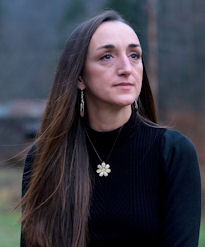Wallenberg Medalist to Visit UM-Flint October 24th
Appalachian environmental activist Maria Gunnoe will be awarded the twenty-second University of Michigan Wallenberg Medal on Tuesday, October 23, 2012, at 7:30 p.m., in Rackham Auditorium.
After the medal presentation, Gunnoe will give the Wallenberg Lecture. This event will be simulcast at UM-Flint in Room 111 French Hall beginning at 7:30 p.m. You can also view the ceremony live by clicking this link: http://ummedia11.adsroot.itcs.umich.edu/itsComm/wallenberg.html
Then on Wednesday, October 24, Gunnoe will visit the UM-Flint campus at 6:00 p.m. and will be part of a discussion in Room 111 French Hall. The events are free and open to the public. Light refreshments will be served.

Gunnoe is a fearless advocate for environmental and social justice. At great personal risk, she rallies communities that face the destruction of their natural environment, and works to educate and build citizen advocacy. A medical technician by training and a former waitress, Gunnoe first volunteered with local advocacy organizations and then began working for the Ohio Valley Environmental Coalition (OVEC) to educate her neighbors about the environmental dangers of mountaintop removal. She organized meetings and trained community members to read mining permits, write letters to the editor, and speak with the media. She also showed them how to organize nonviolent protests and created neighborhood groups to monitor coal companies for illegal behavior and report toxic spills. She is in the vanguard of activists who recognize that environmental justice is critical for the survival of small rural communities that face powerful political and economic interests.
Maria Gunnoe's advocacy has led to closure of mines in the region and stricter regulations for the industry. In 2009, she won the prestigious Goldman Environmental Prize for her work.
This year marks the one-hundredth anniversary of Raoul Wallenberg's birth. A 1935 graduate of the University of Michigan College of Architecture, Swedish diplomat Wallenberg saved the lives of tens of thousands of Hungarian Jews near the end of World War II. Working in Budapest in the late 1930s, Wallenberg came into contact with many Jewish refugees from Europe. In 1944, at the request of Jewish organizations and the American War Refugee Board, the Swedish Foreign Ministry sent Wallenberg on a rescue mission to Budapest. Over the course of six months, Wallenberg issued thousands of protective passports. He confronted Hungarian and German guards to secure the release of Jews who he claimed were under Swedish protection, placing some 15,000 Jews into 31 Safe Houses.
After reporting to Soviet headquarters in Budapest on January 17, 1945, Wallenberg vanished into the Soviet Gulag. Although the Russians claim that Wallenberg died in 1947, the results of numerous investigations into his whereabouts remain inconclusive.
Related Posts
No related photos.
UM-Flint News
The Office of Marketing & Communications can be reached at [email protected].